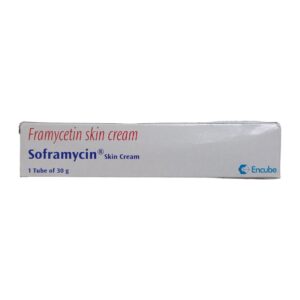FRAMYCETIN
FRAMYCETIN: Framycetin is an antibiotic drug that is commonly used to treat infections caused by bacteria. It belongs to a class of antibiotics known as aminoglycosides.
The mechanism of action of Framycetin involves the inhibition of protein synthesis in bacteria. It binds to the bacterial ribosomes, specifically to the 30S subunit, which prevents the synthesis of vital proteins required for the growth and survival of bacteria. By inhibiting protein synthesis, Framycetin effectively kills or inhibits the growth of bacteria.
Framycetin is commonly available in topical formulations such as creams, ointments, and eye drops. It is primarily used to treat topical infections including infected wounds, burns, and eye infections. It is effective against various types of bacteria including Staphylococcus, Streptococcus, and Pseudomonas species.
The dosage and frequency of Framycetin can vary depending on the formulation and the severity of the infection. It is important to follow the instructions provided by the healthcare professional or the product label. Topical formulations are generally applied directly to the affected area 2-4 times a day.
Like any medication, Framycetin can have side effects. Common side effects may include skin irritation or allergic reactions at the site of application. If allergic reactions occur, it is important to discontinue the use of the medication and seek medical attention. Systemic side effects such as kidney damage and hearing loss are rare with topical use, but can still occur if large amounts are absorbed into the bloodstream.
It is important to note that Framycetin is not effective against infections caused by viruses. It should only be used as directed by a healthcare professional and for the prescribed duration to ensure appropriate treatment of bacterial infections.

